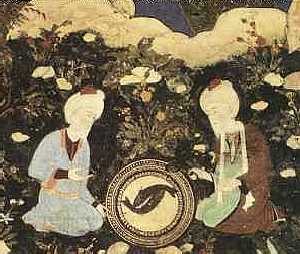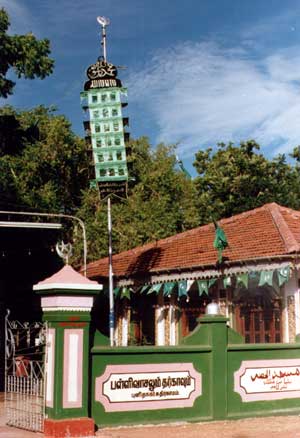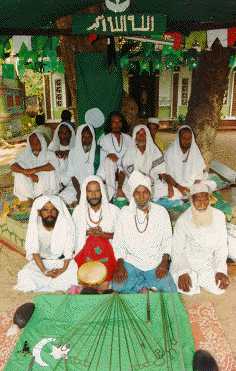|
| ||||||||||||||||||||||||||||
Al-Khadir, Alexander and the Fountain of LifeKataragama's Islamic LegacyIn worldwide Islamic tradition, the story of the prophet or saint known as Khwaja Khadir (Khizr) occupies a role of special distinction. A popular and familiar figure since early pre-Islamic times, al-Khadir (Arabic: 'The Green Man' ) is reputedly the only soul who has gained life immortal from tasting of the Ma'ul Hayat or Fountain of Life once in the distant past, possibly at Kataragama or Khidirgama, 'the home of al-Khadir' according to oral traditions that likewise live on to this day.
In spite of the scorn and disbelief evinced by modern-educated Muslims, the great majority of Islamic believers have long accorded the utmost respect toward this mysterious figure whom theologians variously class as a saint, a prophet or even as an angel. Elusive yet omnipresent, al-Khadir has long been said to reveal himself to those who are worthy of his companionship, to whom he transmits the sirr or divine secrets. Even today, face-to-face encounters with Khwaja Khadir are not uncommon among Islamic mystics in Sri Lanka and worldwide. By assembling a composite picture of al-Khadir as he is portrayed in the Holy Qur'an, in Persian literature and pre-Islamic legendary sources, a possible basis for Kataragama's long association with the ever-youthful 'servant of Allah' emerges. Intriguing patterns come to light that relate al-Khadir to Iskandar or Alexander the Great, who may represent the historical archetype from which evolved into the pan-Indian cult of the war god Skanda. Popular tradition concerning al-Khadir also finds ample support among learned scholars, the ulema. Some say that Khizr lived at the time of the biblical prophet Abraham and that he still may be seen at sacred places. According to the Isaba, 882, he was given immortality after a conversation with his friend the archangel Rafa'il in order to establish the true worship of God on earth and to maintain it. According to hadith or canonical account, al-Khadir was seen at the funeral of the Holy Prophet Mohammed (sal) offering condolence to the Prophet's bereaved companions. Khizr lives on an island (al-Tabari, i, 442) or upon a green carpet in the heart of the sea (al-Bukhari, Tafsir, sura 18, bab 3). He can find water beneath the ground and talks the language of all peoples (al-Suri). Others say that he can make himself invisible at will. Khizr and the biblical prophet Elijah perform haj annually and often appear in the disguise of bedawis. Both are entrusted with the duty of protecting travelers on their journeys. Elsewhere, al-Khadir's realm is an earthly paradise within the human world where Khadir rules over saints and angels; known as Yuh (also a name of the sun), it is situated in the far North. According to early Islamic historians, Khizr was the vizier (Arabic: wazir) of Zul-qarnain, 'The Two-Horned', who is generally considered to be identical with Alexander the Great of Macedonia (4th cent. BC). Al- Baizawi says, "He was Sikandar ar-Rumi, King of Persia and Greece." Says al-Qastalani, the commentator on al-Bukhari, "Zul-qarnain was a king named Sikandar, whose wazir or chancellor was Khizr." In Islamic tradition, al-Sikandar or Iskandar is recalled as a saintly leader or prophet whose armies conquered both East and West. Together with Khizr, who is variously portrayed as Alexander's cook, vizier or general leading the vanguard of his troops, Alexander is represented as having set out to reach the End of the World or the Land of Darkness in search of the Water of Life. "Alexander is guided by Khizr, but when they come to a parting of the ways, each follows a different path, and Khizr alone accomplishes the quest. "Nizami attributes Iskandar's failure to his eagerness (deliberately, in planned fashion) whereas in the case of Khizr 'the Water of Life arrived unsought'." Khizr the cook, general or vizier did so naturally and in the course of duty, whereas Alexander was following his 'own' plan, i.e. with a sense of personal accomplishment or authorship. In this sense, Iskandar failed in the grail quest because he was, as it were, seeking to set himself up as a divinity, a purely hypothetical partner to Allah, Who alone is real. In contrast, Khizr found the Water of Life without even suspecting it. In the Holy Qur'an, passages concerning al-Khadir and Zul-qarnain occur in the eighteenth Sura called, significantly, Kahlf (Arabic: 'cave'; cf. Sanskrit Guha 'cave', also a name of Skanda), a compendium of mystical secrets revealed in response to three questions about legendary figures put to the Prophet Mohammed (sal) by skeptical Jewish doctors. One concerns the legend of time-traveling sleepers sealed up in a cave.
Abul `Abbas, al-Khidr
| ||||||||||||||||||||||||||||
|
| Living Heritage Trust ©2023 All Rights Reserved |




